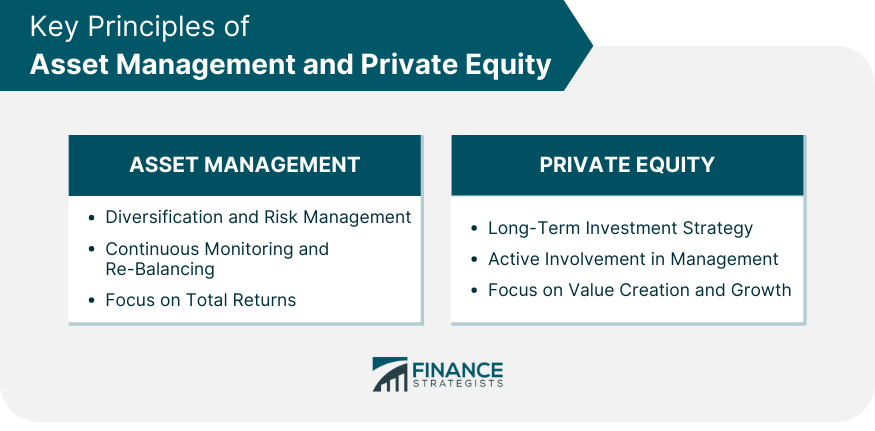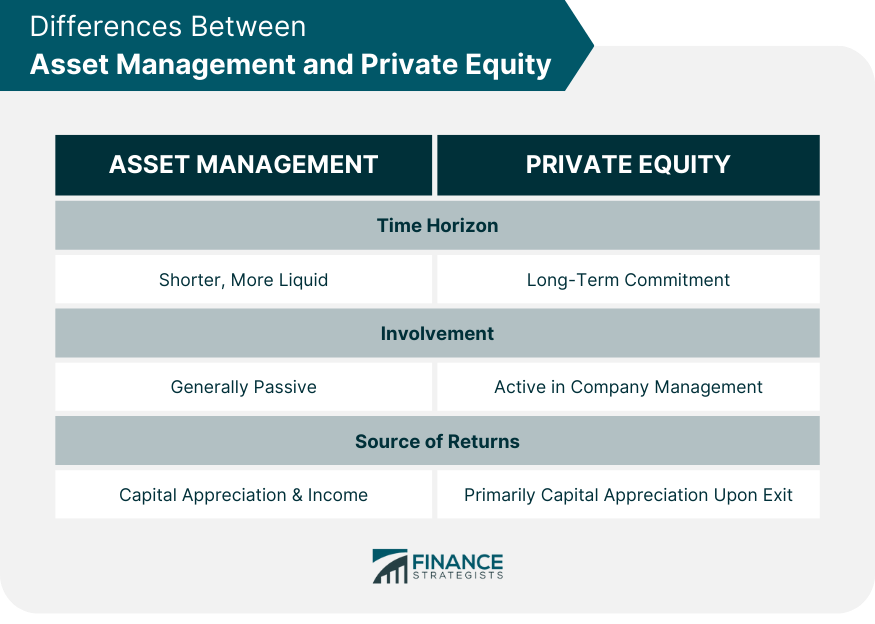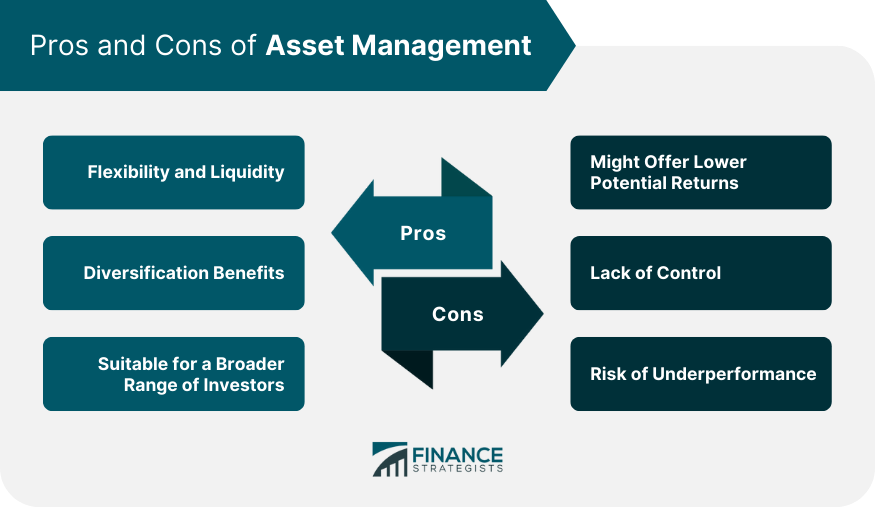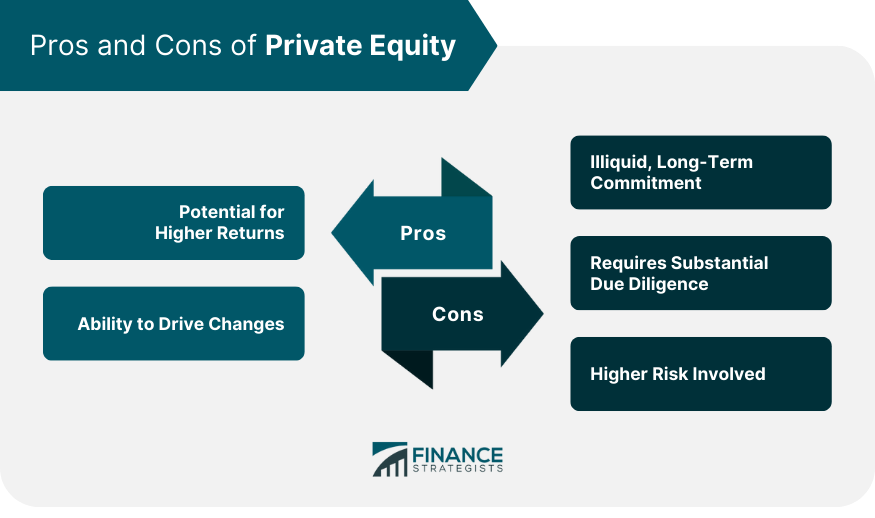Asset Management and Private Equity has its unique methodologies and goals, making them suitable for different kinds of investors. Asset Management refers to the professional management of investments like stocks, bonds, real estate, or other securities, with the aim of achieving specific financial goals. Asset managers use a combination of market research, trend analysis, and financial forecasting to make informed decisions. On the other hand, Private Equity involves investing directly into private companies or conducting buyouts of public companies, resulting in their delisting. The latter requires a deep understanding of the business landscape, rigorous due diligence, and a hands-on approach to unlock value in the investment. The adage, "Don't put all your eggs in one basket," sums up the principle of diversification. It involves spreading investments across a variety of assets like bonds, stocks, real estate, and other classes to minimize risk. This strategy ensures that potential losses in one asset class can be offset by gains in another. The theory is that a single adverse event is unlikely to affect all sectors or asset types at the same time or in the same way. As financial markets evolve, the importance of diversification becomes even more critical to safeguard investments. Asset Management is not a 'set it and forget it' undertaking. It requires constant vigilance. Continuous monitoring of investments allows asset managers to ensure that the asset allocation remains aligned with the investor's goals. Regular assessments can also uncover new investment opportunities or potential threats. If the original asset allocation gets out of sync, due to varying returns from different assets, the portfolio is re-balanced by buying or selling assets, ensuring that the portfolio aligns with the investor's long-term objectives. Asset managers not only strive for capital appreciation but also focus on total returns—gains from interest, dividends, and the increase in the value of the asset. By considering all sources of return, asset managers can provide a more holistic view of an investment's performance. This comprehensive approach to viewing returns helps in achieving the investor's financial goals while ensuring that every potential source of profit is tapped into. Private Equity involves investing in companies for several years. This approach allows time for the implementation of strategic plans, operational improvements, and to realize an increase in value. This long-term horizon means that Private Equity investors must have patience, foresight, and the ability to envision the growth trajectory of their investments. Private Equity investors often take an active role in the management of the companies in which they invest. This involvement ensures that the company aligns with the investor's vision and strategic goals. This active involvement can range from strategic guidance to a complete overhaul of the existing management team. Such deep involvement allows for more significant influence, ensuring the company moves in a direction that maximizes value and potential returns. Private Equity investments aim to increase the value of the company for a profitable exit eventually. This increase in value can be achieved through various strategies like operational improvements, financial restructuring, or strategic acquisitions. These strategies demand not just capital but also expertise, industry knowledge, and a robust network to drive genuine value creation. Asset Management allows investors to have a more liquid investment, which can be bought or sold with relative ease. This flexibility suits those who might need access to their capital sooner. Private Equity, conversely, involves a long-term commitment of funds, often for several years. This approach is best suited for investors who have a longer financial horizon and can afford to have their capital locked in for extended periods. In Asset Management, investors are typically passive, with the investment firm making decisions about buying and selling assets. They entrust the daily management to the experts while retaining oversight. However, Private Equity investors often play an active role in the strategic management of the firms in which they invest, ensuring that their investment vision is realized in the operational performance of the company. In Asset Management, returns are realized from both capital appreciation and income generated from the investment, like dividends or interest. This dual source of returns can provide stability and predictability to the investment's performance. In contrast, Private Equity investors typically realize returns through capital appreciation upon the exit from the investment, often after several years of hands-on involvement and strategic guidance. Asset Management generally provides greater flexibility and liquidity. Investors can add to or reduce their investment based on their financial needs or market conditions. This flexibility allows them to adapt to life's unforeseen events or to capitalize on emerging opportunities. Because of the wide range of assets in a portfolio, Asset Management provides a high degree of diversification, helping to mitigate risk and stabilize returns. Diversification also means that investors can benefit from global trends, technological innovations, or emerging sectors, ensuring that they are not overly reliant on any single investment or market. Asset Management is typically available to a broader range of investors, both institutional and individual, and can cater to a wide array of financial goals and risk tolerance. Whether you're a seasoned investor or just starting out, there's likely an asset management strategy tailored to your needs. Due to fees and the diversified nature of most funds, the returns may be lower than if an investor picked individual investments. For example, a mutual fund with an expense ratio of 1% will have to generate 1% more in returns just to break even. Additionally, the diversified nature of most funds means that they may not be able to capture the full upside of a particular market or sector. Investors who use asset management give up some control over their investments. They must trust that the asset manager will make decisions that are in their best interests. This can be a difficult decision for some investors, as they may not want to give up control of their money. Additionally, if the asset manager makes poor decisions, the investor could suffer significant losses. Asset managers are not always able to outperform the market. In fact, some asset managers may underperform the market consistently. This is because the market is constantly changing, and it can be difficult for asset managers to keep up. Additionally, asset managers may make mistakes, which can lead to underperformance. Private Equity can offer significantly higher returns compared to traditional asset management. With the right investment, and over the right period, the returns can be monumental. However, these returns come with increased risk and require a nuanced understanding of the investment landscape. Private Equity investors can drive operational changes in the companies they invest in, helping to unlock value and increase returns. This hands-on approach ensures that the investor's expertise and strategic vision can be directly applied to the operational performance of the company. Private equity investments are illiquid, which means that they cannot be easily sold. This means that investors must be prepared to commit their money for a long period of time, often 5-7 years or more. Private equity investments require substantial due diligence, which can be a time-consuming and expensive process. This is because investors need to carefully evaluate the companies they are considering investing in to make sure that they are making a good investment. This due diligence process can take several months or even years, and it can be very expensive. Private equity investments are considered to be high-risk investments. This is because the companies they invest in are often small and growing, which means that they are more likely to fail. In addition, private equity investments are often leveraged, which means that the investors are borrowing money to make the investment. This can magnify the losses if the investment goes sour. The choice between Asset Management and Private Equity comes down to the investor's individual financial goals, risk appetite, and investment horizon. Both strategies have their place in the financial landscape, and understanding their intricacies can lead to more informed investment decisions. Asset Management might be more appropriate for investors who seek steady returns, prefer a diversified investment portfolio, and want the flexibility to withdraw their investment relatively easily. It offers the comforts of professional management, a diversified approach, and relatively more liquidity. On the other hand, Private Equity might be a better fit for investors with a long-term investment horizon, higher risk tolerance, and the capacity to commit substantial funds for an extended period. They must also be comfortable with potentially having an active role in the management of the company in which they are investing. It's an avenue for those seeking potentially higher returns, albeit with increased risk and commitment. Asset Management and Private Equity are two different investment strategies with their own unique advantages and disadvantages. Asset Management is a more passive approach that offers flexibility and liquidity, while Private Equity is a more active approach that can offer higher returns. The best approach for you will depend on your individual circumstances and investment goals. If you are looking for a more flexible and liquid investment, then Asset Management may be a good option for you. However, if you are looking for the potential for higher returns, then Private Equity may be a better choice. It is important to do your research and understand the risks involved in both Asset Management and Private Equity before making an investment decision. You should also consider working with a financial advisor who can help you choose the right investment strategy for your needs.Overview of Asset Management and Private Equity
Key Principles of Asset Management
Diversification and Risk Management
Continuous Monitoring and Re-Balancing
Focus on Total Returns
Key Principles of Private Equity
Long-Term Investment Strategy
Active Involvement in Management
Focus on Value Creation and Growth

Differences Between Asset Management and Private Equity
Time Horizon of Investments
Level of Involvement in the Operations of Invested Entities
Source of Returns

Pros and Cons of Asset Management
Pros
Flexibility and Liquidity
Diversification Benefits
Suitable for a Broader Range of Investors
Cons
Might Offer Lower Potential Returns
Lack of Control
Risk of Underperformance

Pros and Cons of Private Equity
Pros
Potential for Higher Returns
Ability to Drive Operational Changes
Cons
Illiquid, Long-Term Commitment
Requires Substantial Due Diligence
Higher Risk Involved

Asset Management vs Private Equity: Which Is Better?
Bottom Line
Asset Management vs Private Equity FAQs
Asset Management refers to the professional handling of investments like stocks, bonds, or real estate to achieve specific financial objectives.
Private Equity involves investing directly in private firms or conducting public company buyouts, whereas Asset Management focuses on diversifying investments across asset types.
Yes, Asset Management generally offers more liquidity and flexibility, making it suitable for both short-term and long-term investors.
Private Equity requires investing in companies for several years, allowing for strategic changes and value growth before realizing returns.
Private Equity often offers higher potential returns than Asset Management but comes with increased risks and longer investment horizons.
True Tamplin is a published author, public speaker, CEO of UpDigital, and founder of Finance Strategists.
True is a Certified Educator in Personal Finance (CEPF®), author of The Handy Financial Ratios Guide, a member of the Society for Advancing Business Editing and Writing, contributes to his financial education site, Finance Strategists, and has spoken to various financial communities such as the CFA Institute, as well as university students like his Alma mater, Biola University, where he received a bachelor of science in business and data analytics.
To learn more about True, visit his personal website or view his author profiles on Amazon, Nasdaq and Forbes.











